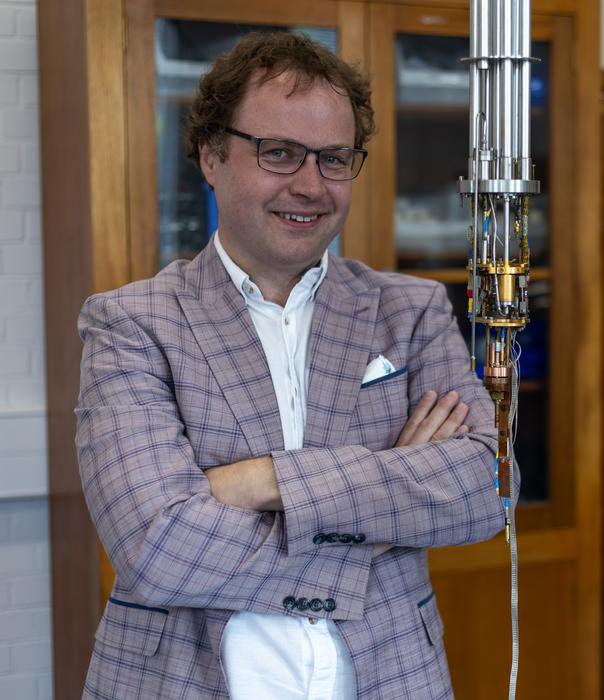
The University of Birmingham has embarked on an ambitious journey to harness the remarkable properties of graphene in the cutting-edge field of quantum computing. This initiative is poised to revolutionize the way quantum devices are developed and implemented, particularly through the collaboration with Paragraf Ltd, a pioneering company in the mass production of graphene-based electronics. With generous funding from Innovate UK and the UKRI Future Leaders Fellowship, totaling £3.4 million, the research team led by Dr. Matt Coak aims to overcome the manufacturing challenges of graphene and maximize its potential in a myriad of groundbreaking applications.
Graphene, a single layer of carbon atoms arranged in a two-dimensional lattice, is celebrated for its exceptional electrical, mechanical, and thermal properties. Among its myriad capabilities, graphene is known for its remarkable electrical conductivity—that is, it can facilitate the flow of electric current with unprecedented efficiency. The characteristics of graphene have positioned it as a revolutionary material for the next generation of electronic devices, particularly in the realms of quantum computing and advanced sensors.
Dr. Coak’s research is focused on constructing and testing graphene-based magnetic sensors within the context of quantum computing. The goal is to enhance the performance of qubit processors, the building blocks of quantum computers that rely on quantum bits to process information at remarkable speeds. Traditional computing relies on binary systems, which are limited in their computational capabilities. Quantum computing, in contrast, offers an exponential boost by leveraging the principles of quantum mechanics, which has the potential to solve complex problems far faster than current supercomputers.
One of the most intriguing applications of graphene resides in its potential to function as a sensor for quantum systems. Graphene sensors are capable of operating with unparalleled precision at extremely low temperatures, making them ideally suited for the operational environment of quantum computers, where maintaining optical and magnetic stability is crucial. However, the challenge lies in the viability of producing these sensors at scale while ensuring they can perform effectively in the unique conditions required by quantum technology.
Despite its vast potential, the area of graphene electronics has faced significant hurdles, particularly concerning the reliability and consistency of manufacturing processes. Historically, scaling up the production of high-quality graphene while retaining its desired properties has proven challenging. Nevertheless, with the support of Innovate UK, the research team is committed to driving advancements in graphene production techniques, including methods to effectively create six-inch wafers essential for larger-scale production. This progress could mark a pivotal turning point in the maturation of graphene electronics as a commercial technology.
The collaboration between the University of Birmingham and Paragraf is set against a backdrop of heightened interest in quantum technologies. Dr. Natasha Conway, Research Director at Paragraf, emphasizes the pivotal role graphene magnetic sensors can play in advancing quantum computing. These sensors will enable researchers to gain deeper insights into the operational parameters of quantum computers, enriching the scientific understanding of their workings while concurrently paving the way for practical applications in various industries.
Dr. Coak articulates the significance of this research: “Until now, cryogenic testing of practical graphene devices has not been conducted.” The team’s exploration of these new frontier materials will uncover how graphene exhibits quantum behavior under extreme conditions. Their findings could illuminate fundamental aspects of quantum mechanics, with implications that extend beyond computation, offering potential advancements in fields such as battery technology, molecular sensing, and agricultural technology.
The support received will empower Dr. Coak’s group to undertake systematic tests involving graphene magnetic field sensors under both high and low-temperature conditions, enabling the detailed analysis of their performance under varied operational environments. As they work to formulate theoretical models that accurately depict the electronic behavior of graphene, they are also delving into the quantum physics inherent within this material. This comprehensive understanding will be vital for future endeavors aimed at enhancing the capabilities of both quantum and non-quantum electronic systems.
With an eye firmly trained on sustainability, Simon Thomas, the Co-Founder and CEO of Paragraf, highlights the importance of scaling graphene technology in solving significant challenges that persist across multiple sectors. By investing resources into developing practical applications, the goal is to position the UK as a leader in the burgeoning advanced materials revolution—a strategy that could yield considerable economic and scientific advantages.
In sum, Birmingham’s cutting-edge investigation into graphene’s role within quantum computing epitomizes the confluence of advanced materials science and transformative technology. As researchers continue to unravel the potentials of this remarkable material, every step taken brings us closer to realizing the full spectrum of capabilities that graphene promises to deliver in the near future.
Armed with the latest advancements in graphene technology and dedicated research efforts, the University of Birmingham and its partners are not just advancing science; they are defining a new era in technology that holds profound implications for society as a whole. The journey is far from over, but with such robust backing and collaborative endeavor, the prospects for graphene in quantifying and redefining our understanding of computational technologies could soon become a monumental reality.
Subject of Research: Graphene in Quantum Computing
Article Title: Harnessing Graphene: The Future of Quantum Computing
News Publication Date: October 2023
Web References: University of Birmingham, Paragraf Ltd, UKRI Future Leaders Fellowships
References: N/A
Image Credits: University of Birmingham
Keywords
Graphene, Quantum Computing, Advanced Materials, Electronic Devices, Cryogenic Testing, Nanotechnology, Graphene Sensors, Innovation, Research Collaboration.





